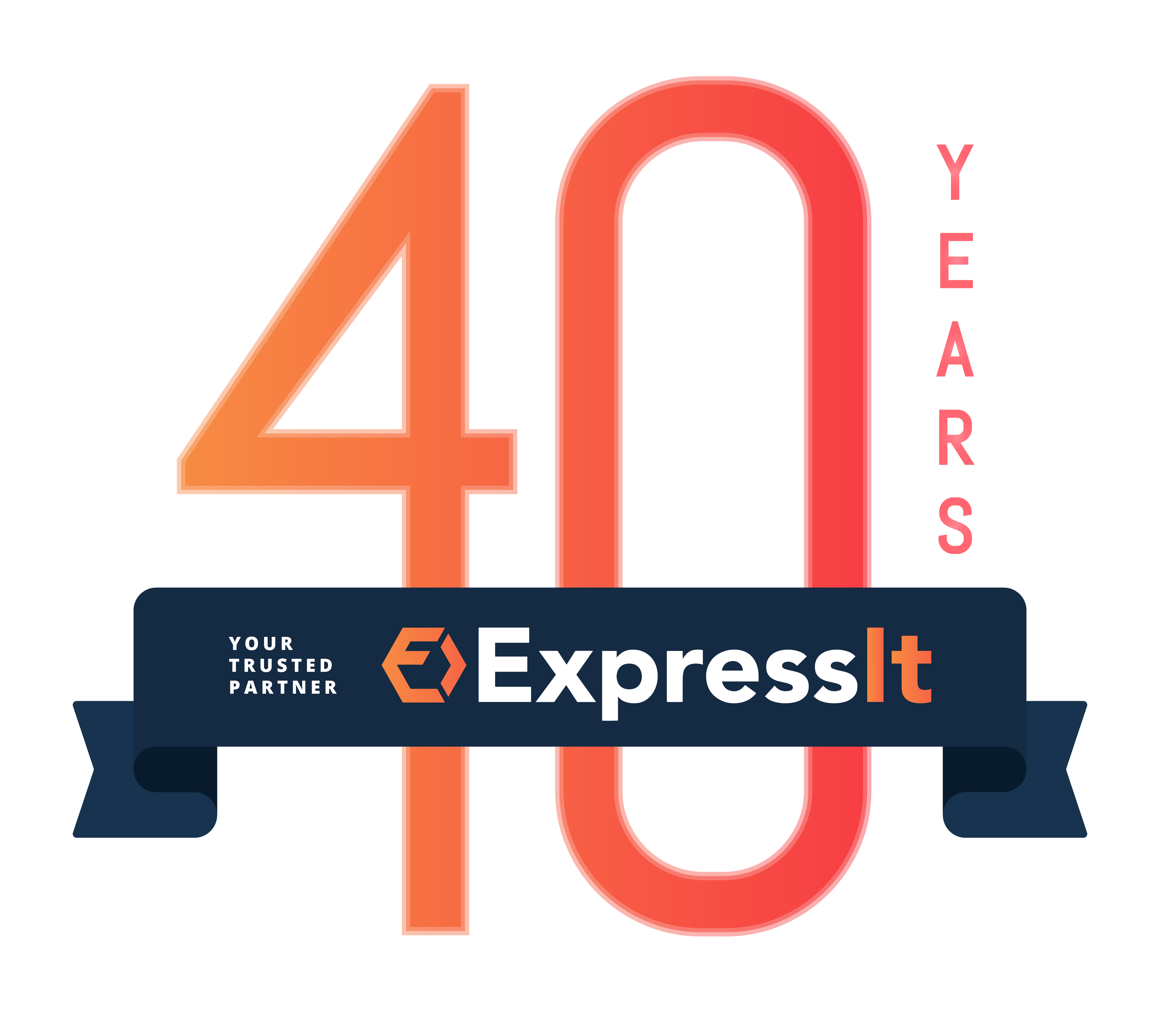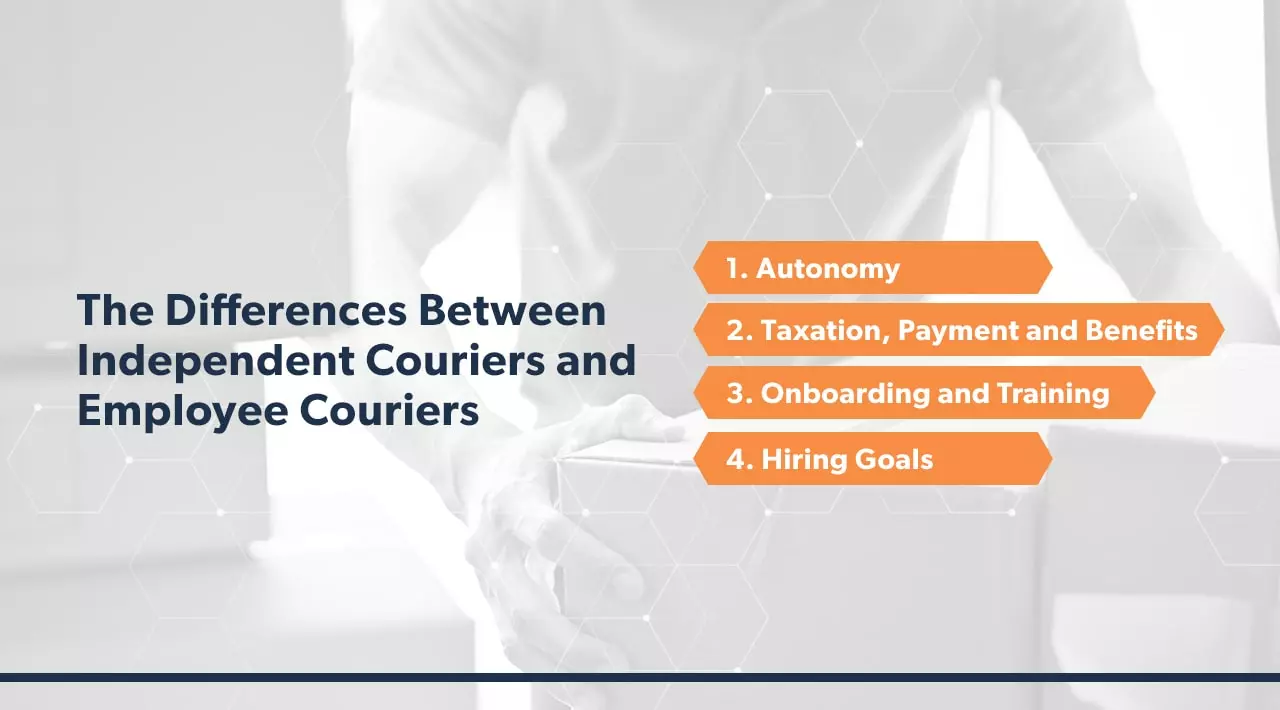Both independent contractor couriers and employee couriers offer similar services — package delivery and disptach solutions. However, there are several differences between the two in terms of control, payment structure and taxation, onboarding and training, and hiring goals.
Let’s take a look at independent courier contractors vs. employee couriers to help you make the best choice for your company.
What Is an Independent Contractor Courier?
An independent courier contractor is an individual or corporate body offering courier services for separate entities. They contract with companies as independent service providers and use their own vehicles to make deliveries. Rather than be paid a salary or hourly wage, independent contractor couriers are paid per delivery or by the mile.
When an assignment becomes available, the primary company notifies the independent courier and provides them with the necessary details. The independent delivery driver then collects and delivers the package to the customer. The independent contractor must document the delivery and verify the recipient’s identity before releasing the package.
What Is a Remote Courier?
A remote courier or work-from-home courier is also an independent contract delivery provider. Typically, independent courier companies have their vehicles and staff to provide the needed services. However, a person or agency may also partner with the supplier and a dispatch rider or delivery company to offer those services.
In other words, a remote courier may coordinate operations between the sender of the package and the delivery team while remaining completely independent of the two.
What Is the Employee Courier Model?
Under the employee courier model, the delivery company has its own vehicle fleet and hires employees. This model is the most trusted of the two, as the employer has substantial control over how the delivery driver conducts their operations. A contract of employment defines the relationship between the employer and employee.
Contrary to independent contract couriers, the employee model requires the employer to perform end-to-end delivery activities regularly in exchange for a salary or hourly wage. As a result, the employer pays all employment-related expenses, such as payroll taxes, health insurance and other benefits. The employer also takes charge of additional costs, such as fuel and maintenance.
The Differences Between Independent Couriers and Employee Couriers
There are many differences between independent contractors providing delivery services and employee-based couriers, including the following:
1. Autonomy
One of the most distinguishing factors from a legal point of view is the degree of control the employer has over the worker’s performance of services. For the employee model, the employer controls the manner and means by which the employee performs their work.
The IRS adopts a 20-factor test for classifying employees vs. independent contractors. The standards suggest that the more the employer controls how, when and where the courier performs their duty, the more likely they are to be employees. Besides helping the IRS for tax purposes, the classification is vital because it helps the customer know who to hold liable if a challenge arises.
2. Taxation, Payment and Benefits
Independent contractors and employee couriers are paid and taxed differently. There are also differences in terms of benefits.
Employee couriers are on the business’s payroll, meaning the company pays them salaries or hourly wages. The company withholds the appropriate taxes, including federal income tax, medicare tax and social security tax, and pays them on a consistent basis, often bi-weekly. Additionally, employee couriers enjoy benefits such as health insurance, commuter benefits, paid vacation and stock options.
An independent courier generally pays their own taxes, such as self-employement taxes, after receiving the agreed-upon contract sum. When it comes to benefits like health insurance, independent contractors are responsible for paying for these out of pocket.
3. Onboarding and Training
Contract couriers perform specific tasks, meaning they only receive information necessary to complete that project. Full-time couriers require a lengthy onboarding process to help them understand the intricacies of the job, the company’s culture and overall goals. They also receive ongoing training to help them improve their skills and provide more satisfactory customer service.
4. Hiring Goals
Employee couriers are hired and trained to be a part of the company’s brand. They tend to be loyal, especially with the proper treatment, which also affects job performance. Employee couriers are also subject to the company’s directions and policies. The aim is to integrate them into the organization’s systems and encourage them to provide the best delivery services.
Independent contractors are much less involved with the company and may only be hired on an as-needed basis.
Is the Employee Courier Model Better Than the Independent Courier Contractor Model?
Most businesses prefer employee couriers over independent contractors for several reasons, such as:
- Better accountability: Because employee couriers are part of the company, the company generally takes responsibility for their actions. This means customers with complaints can quickly identify who to contact or hold liable. Consequently, dispatchers provide the necessary training and tools to ensure optimal performance.
- Work more hours: Generally, independent contractors determine their working hours and days, and employee couriers work within clearly specified durations and can work overtime. The latter scenario makes it easier to meet customers’ needs even when demand increases.
- Easy identification: Identification is essential for most organizations patronizing courier services. This is especially true when the package is sensitive. A courier’s uniform and identification mark make it easier to trust them.
- Reliability: Employee couriers are available when you need them. Unlike independent contract couriers who accept orders according to their convenience, employee couriers have clearly defined work schedules and can work overtime to meet your needs.
- Tracking capabilities: The best dispatchers track your packages from beginning to end. They use sophisticated GPS and other tracking systems to monitor the drivers’ locations. This improves security, allows them to use the best routes and provides real-time updates to customers.
- Speed of delivery: Having a dedicated dispatching team improves efficiency. Dispatchers leverage sophisticated technology for route optimization strategies to get items to end users faster.
- Customizable services: What sets the best employee couriers apart from independent contractors is the ability to provide customizable deliveries. This improves convenience and efficiency, especially when dealing with high-priority packages.
ExpressIt: Your Trusted Delivery Solutions Provider
At face value, independent contractors and employee model couriers perform the same services — moving packages from one place to another. However, employee model couriers are more reliable and accountable and offer convenient services. The best delivery service provides solutions tailored to your specific needs. That’s why it’s crucial to partner with an agency with an excellent track record.
ExpressIt has over 40 years of experience offering the premier delivery solutions across various locations on the East Coast. Our tracking system ensures you receive your packages on time in the expected condition. We allow you to customize your deliveries and offer options, including same-day, courier, routed and last-minute deliveries.
Contact us today for more information!



